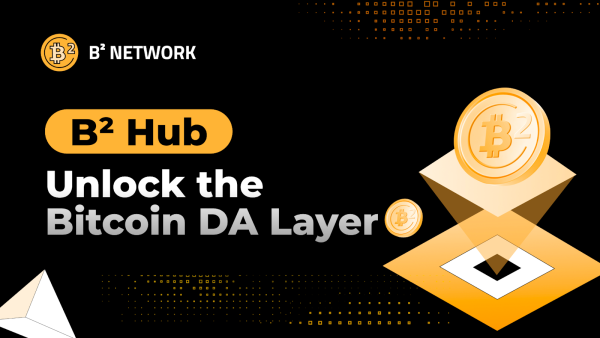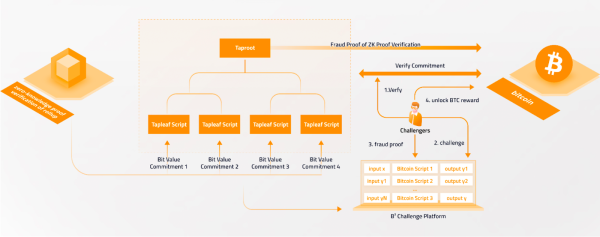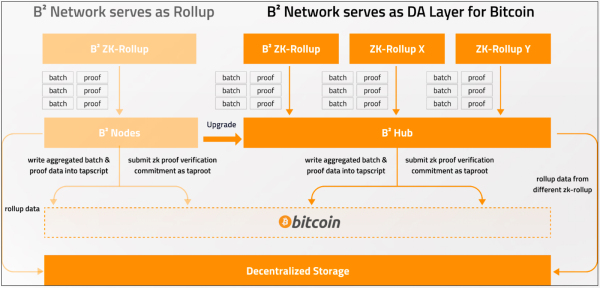B² Network has been a pioneering solution for verifying zero-knowledge proofs (zk proofs) on Bitcoin since its launch. Back in the early days, It was the most significant challenge when the infrastructure of B² Network was designing. With the introduction of B² Hub, B² Network can now share the DA layer with other Bitcoin rollups, thereby realizing Bitcoin rollup-as-a-service.

ZK proof can’t be verified on Bitcoin directly
The primary reason Bitcoin struggles to directly verify zk proofs lies in its inherent design philosophy and blockchain security.
1. Design Philosophy:
Bitcoin's design philosophy emphasizes decentralization and security. Thus, Bitcoin has opted for a relatively simple yet secure scripting language, limiting Bitcoin's smart contract and complex verification capabilities. Zero-knowledge proofs typically involve intricate mathematical operations that may exceed the capabilities of Bitcoin's scripting language.
2. Computational and Storage Resources
Verifying zero-knowledge proofs requires significant computational and storage resources. The design of the Bitcoin network implies that nodes must have sufficient resources to verify all transactions, but directly verifying zk proofs may surpass the performance requirements of network nodes. This design ensures Bitcoin's decentralization and security but makes it challenging to accommodate more complex verification mechanisms.
3. Network Consensus:
Bitcoin's consensus algorithm (proof-of-work) is designed to ensure that all nodes reach consensus on transaction order and state. Introducing complex verification mechanisms may lead to consensus issues, as different nodes may achieve varying degrees of proficiency in verification, affecting the overall security of the network.
Current Bitcoin zk rollup solutions simply upload zk proofs onto the Bitcoin blockchain through inscription, lacking the crucial process of verification on the Bitcoin network. This absence of verification poses potential security issues. Consider a scenario where a rollup provider initiates a transaction from users’ wallet, and if the result is not verified by Bitcoin, their wallets could be emptied without detection.
B² Network innovatively uses zk proof commitment to verify the proofs on Bitcoin
After months of exploration, B² Network has finally devised a method to verify zk proofs on Bitcoin. The workflow is as follows:
1. The zk proofs' verification commitments are transformed into taproots.
2. B² submits the taproots onto the Bitcoin blockchain.
3. Challengers (Validators), incentivized by BTC rewards, can raise challenges if any issues are detected.
4. The zk proofs undergo verification on the Bitcoin network.

The mechanism of B² Challenge-Response protocol
This process operates under the B² Challenge-Response protocol, a mechanism that ingeniously enables B² rollup verification on the Bitcoin blockchain, ensuring that the B² Rollup is as secure as Bitcoin.
The Next: Launching B² Hub and making B² Rollup as a service
The proliferation of Bitcoin rollups is poised to significantly alter the landscape of the Bitcoin ecosystem. B² Network eagerly anticipated witnessing the emergence of more robust applications and innovations within this space. As a result, B² Network has decided to introduce B² Hub, an expansion stemming from both B² Nodes and our Challenge-Response protocol.
How B² Hub Works:
1. Any Bitcoin rollup can leverage the B² Hub for verification on the Bitcoin network, thereby saving time and reducing costs.
2. B² Hub will compile aggregated batch and proof data into tapscript, submitting the zk proof verification commitment as the taproot to Bitcoin collectively.

B² Network serves as the DA Layer for Bitcoin
The modular DA layer has proven successful and effective in various ecosystems. Currently, we are collaboratively constructing the BTC ecosystem alongside several RaaS participants. B² Network believes that by sharing the solution for verifying zk-proof on Bitcoin, the Bitcoin ecosystem can benefit and undergo accelerated growth.
Disclaimer: This press release may contain forward-looking statements. Forward-looking statements describe future expectations, plans, results, or strategies (including product offerings, regulatory plans and business plans) and may change without notice. You are cautioned that such statements are subject to a multitude of risks and uncertainties that could cause future circumstances, events, or results to differ materially from those projected in the forward-looking statements, including the risks that actual results may differ materially from those projected in the forward-looking statements.

ZK proof can’t be verified on Bitcoin directly
The primary reason Bitcoin struggles to directly verify zk proofs lies in its inherent design philosophy and blockchain security.
1. Design Philosophy:
Bitcoin's design philosophy emphasizes decentralization and security. Thus, Bitcoin has opted for a relatively simple yet secure scripting language, limiting Bitcoin's smart contract and complex verification capabilities. Zero-knowledge proofs typically involve intricate mathematical operations that may exceed the capabilities of Bitcoin's scripting language.
2. Computational and Storage Resources
Verifying zero-knowledge proofs requires significant computational and storage resources. The design of the Bitcoin network implies that nodes must have sufficient resources to verify all transactions, but directly verifying zk proofs may surpass the performance requirements of network nodes. This design ensures Bitcoin's decentralization and security but makes it challenging to accommodate more complex verification mechanisms.
3. Network Consensus:
Bitcoin's consensus algorithm (proof-of-work) is designed to ensure that all nodes reach consensus on transaction order and state. Introducing complex verification mechanisms may lead to consensus issues, as different nodes may achieve varying degrees of proficiency in verification, affecting the overall security of the network.
Current Bitcoin zk rollup solutions simply upload zk proofs onto the Bitcoin blockchain through inscription, lacking the crucial process of verification on the Bitcoin network. This absence of verification poses potential security issues. Consider a scenario where a rollup provider initiates a transaction from users’ wallet, and if the result is not verified by Bitcoin, their wallets could be emptied without detection.
B² Network innovatively uses zk proof commitment to verify the proofs on Bitcoin
After months of exploration, B² Network has finally devised a method to verify zk proofs on Bitcoin. The workflow is as follows:
1. The zk proofs' verification commitments are transformed into taproots.
2. B² submits the taproots onto the Bitcoin blockchain.
3. Challengers (Validators), incentivized by BTC rewards, can raise challenges if any issues are detected.
4. The zk proofs undergo verification on the Bitcoin network.

The mechanism of B² Challenge-Response protocol
This process operates under the B² Challenge-Response protocol, a mechanism that ingeniously enables B² rollup verification on the Bitcoin blockchain, ensuring that the B² Rollup is as secure as Bitcoin.
The Next: Launching B² Hub and making B² Rollup as a service
The proliferation of Bitcoin rollups is poised to significantly alter the landscape of the Bitcoin ecosystem. B² Network eagerly anticipated witnessing the emergence of more robust applications and innovations within this space. As a result, B² Network has decided to introduce B² Hub, an expansion stemming from both B² Nodes and our Challenge-Response protocol.
How B² Hub Works:
1. Any Bitcoin rollup can leverage the B² Hub for verification on the Bitcoin network, thereby saving time and reducing costs.
2. B² Hub will compile aggregated batch and proof data into tapscript, submitting the zk proof verification commitment as the taproot to Bitcoin collectively.

B² Network serves as the DA Layer for Bitcoin
The modular DA layer has proven successful and effective in various ecosystems. Currently, we are collaboratively constructing the BTC ecosystem alongside several RaaS participants. B² Network believes that by sharing the solution for verifying zk-proof on Bitcoin, the Bitcoin ecosystem can benefit and undergo accelerated growth.
Disclaimer: This press release may contain forward-looking statements. Forward-looking statements describe future expectations, plans, results, or strategies (including product offerings, regulatory plans and business plans) and may change without notice. You are cautioned that such statements are subject to a multitude of risks and uncertainties that could cause future circumstances, events, or results to differ materially from those projected in the forward-looking statements, including the risks that actual results may differ materially from those projected in the forward-looking statements.
Comments
Post a Comment